International survey finds every third employee would consider relocating for a better job
More willing to relocate are employees with higher income and higher educational level (29 %), and they are mainly willing to relocate for a job within their own profession (55%). Relocating with families (60%) and the potential for financial gain (60%) are the main motivators for working abroad. Alma Career survey was conducted in 13 Eastern European countries with 76.357 responses.
International recruiting service provider Alma Career performed a survey in 13 countries–Bosnia and Herzegovina, Bulgaria, Czech Republic, Croatia, Estonia, Finland, Latvia, Lithuania, North Macedonia, Poland, Serbia, Slovakia, and Slovenia–to determine the willingness of people to relocate for a better job opportunity. The survey was conducted via Paylab, the international salary survey platform developed by Alma Career.
“One of our presumptions was that people in the lower income groups with less education would have been the most significant groups interested in relocating to a new country for a better job opportunity. The survey reveals that rather the opposite is true, the higher the education and the better the salary, the more likely are the top employees interested in relocating within their own profession,” comments Alma Career Business Director, Vesa-Pekka Kirsi.
He continues to comment the surprising findings:
“It appears that the most educated and top paid employees willing to relocate are not willing to do it at any price, they are only willing to relocate for a relatively short period of time of some weeks or months and they see it’s important to take their families with them.”
People in higher salary groups are becoming more likely to travel abroad in search of employment prospects (29%). The higher salary group the respondents presents, the more willing they are to relocate. On the other hand, only 16% of people in lower income categories say they would consider moving for job.
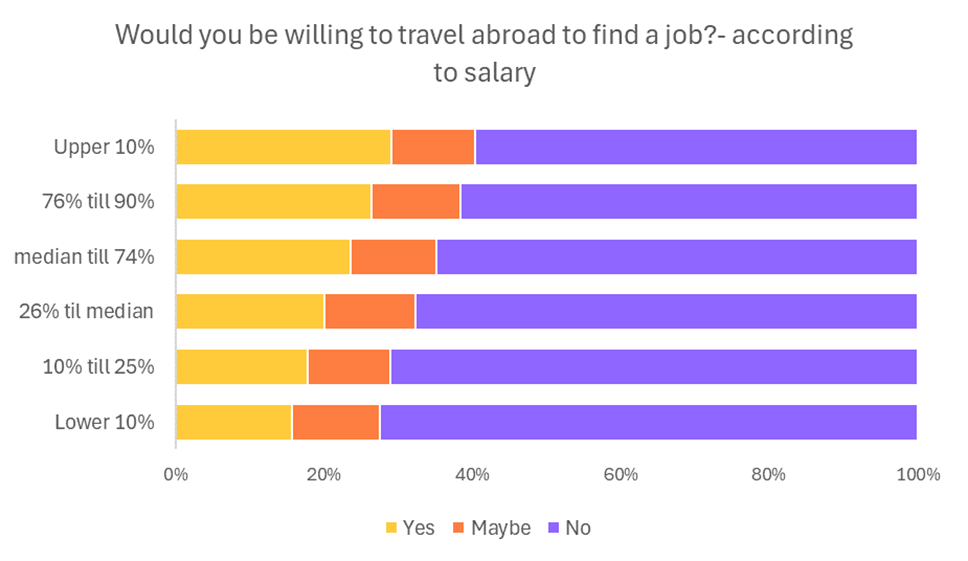
Post-graduate education converses unwillingness to accept lower-ranking positions
Respondents with primary and secondary education are most open (53%) to consider a lower-ranking position abroad than they currently have if they were to relocate. Conversely, individuals with postgraduate qualifications–master's degree (55%) and doctorate (57%)–exhibit the lowest likelihood of relocating for lower-ranking positions abroad. Therefore, individuals with lower levels of education seem to be more inclined towards relocating for career opportunities, if it means accepting lower ranking position than they have in their own country.
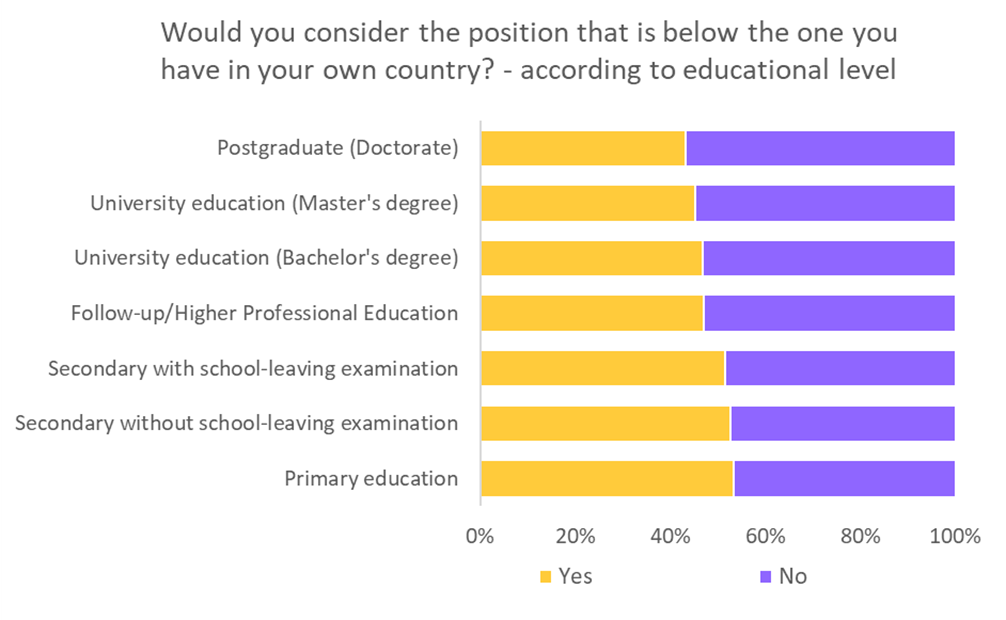
Which factors discourage or persuade to relocate?
Across Central Europe, the Balkans, and the Baltic and Finland regions, the prospect of a better salary is the most compelling reason for considering employment abroad, with around 59% to 61% of individuals citing it as a key motivator. The second most persuasive aspect is the chance to bring family members, especially in the Baltic and Finland regions, where 42% find it vital. While language progress and political or economic conditions have less impact, career promotion and professional development are noteworthy motivations. Families and the potential for financial gain seem to be the main motivators for people thinking about working abroad.
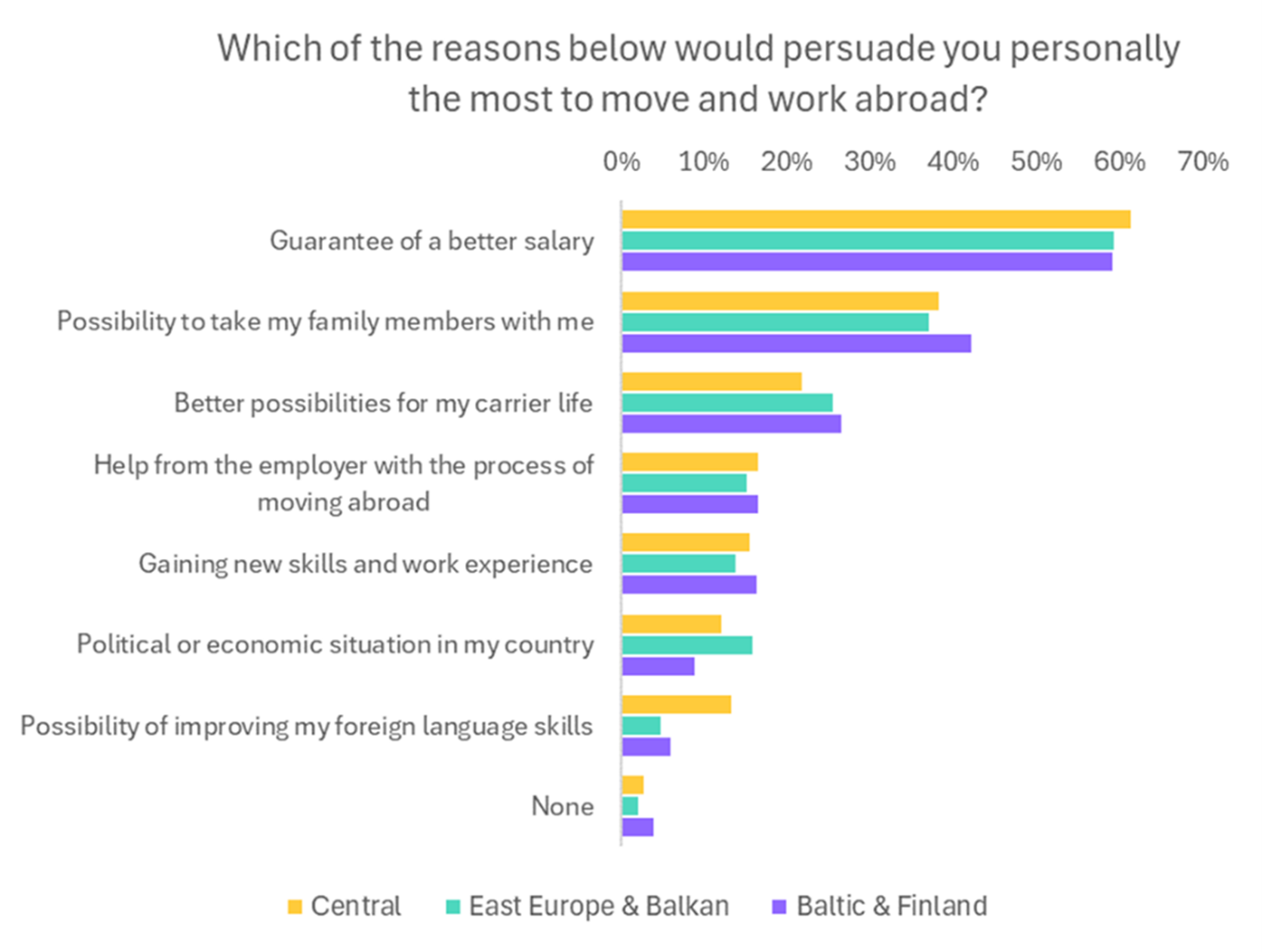
The biggest obstacle to working abroad is the possibility of being separated from friends and family for an extended period of time. Those from Central Europe are the most concerned about this issue, with 60% (55% all respondents) of them viewing it as a significant barrier. About one-fifth of the population in these areas views language barriers as a hindrance. Other noteworthy issues include worries about discrimination at work and anxiety about adjusting to a new setting. Even if health and travel-related concerns are less common, they nevertheless add to the general reluctance to look for work abroad.
These observations imply that the main things that can prevent people from taking advantage of abroad employment chances are emotional connections and communication problems.
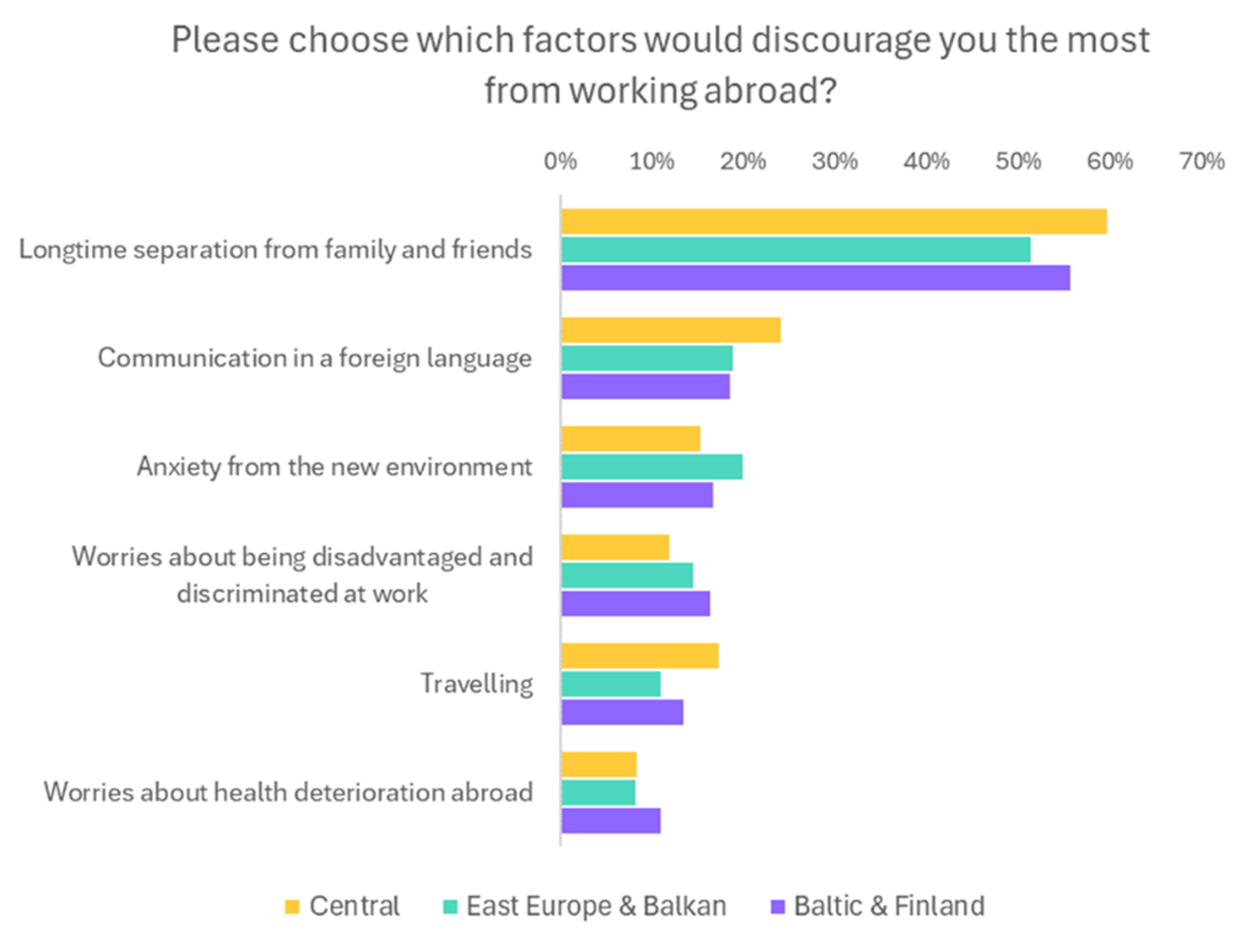
TOP COUNTRIES TO RELOCATE TO
Top three countries to relocate to in Europe are Germany, Austria, and Switzerland. Interestingly, Spain was most popular relocation country among the Baltics. Here is list of three most popular relocation target countries among those willing to relocate:
- Bosnia and Herzegovina: Germany, Austria and Slovenia
- Bulgaria: Germany, Spain and UK
- Czech Republic: Germany, EU and Austria
- Croatia: Austria, Germany and Switzerland
- Estonia: Finland, EU and Spain
- Finland: -- not enough data --
- Latvia: Spain, Germany and Sweden
- Lithuania: Spain, Germany and Norway
- North Macedonia: Germany, Switzerland and Slovenia
- Poland: Germany, Spain and USA
- Serbia: Germany, Austria and USA
- Slovakia: Austria, Czech Republic and Germany
- Slovenia: Austria, Germany and Switzerland
Preferences for jobs when working abroad
According to the report, the Czech Republic (CZ) and Macedonia (MK) both reported that 48% of respondents are open to any job available, reflecting a flexible approach to employment opportunities abroad. On the other hand, a sizable 52% of respondents in each of these nations stated that they would rather work exclusively in their field of expertise.
In Bosnia and Herzegovina (BA), the preference for profession-specific employment rises to 61%, with 39% willing to consider any available job. Similar trends can be seen in Slovakia (SK) and Serbia (RS), where 63% and 64% of respondents, respectively, choose employment in their current fields.
Estonia (EE) presents a 66% preference for professional employment, while Poland (PL) has a slightly higher rate at 67%. Bulgaria (BG) and Croatia (HR) both report a 68% preference for profession-specific roles, indicating a strong desire for career continuity.
On the other hand, Latvia (LV) sees this number increase to 70%, and Lithuania (LT) even more so at 74%, showcasing a growing trend towards professional alignment in job choices abroad. Finland (FI) tops the chart, with a substantial 80% of individuals preferring to work only in their profession, underscoring the importance of career-focused opportunities for Finnish workers considering international relocation.
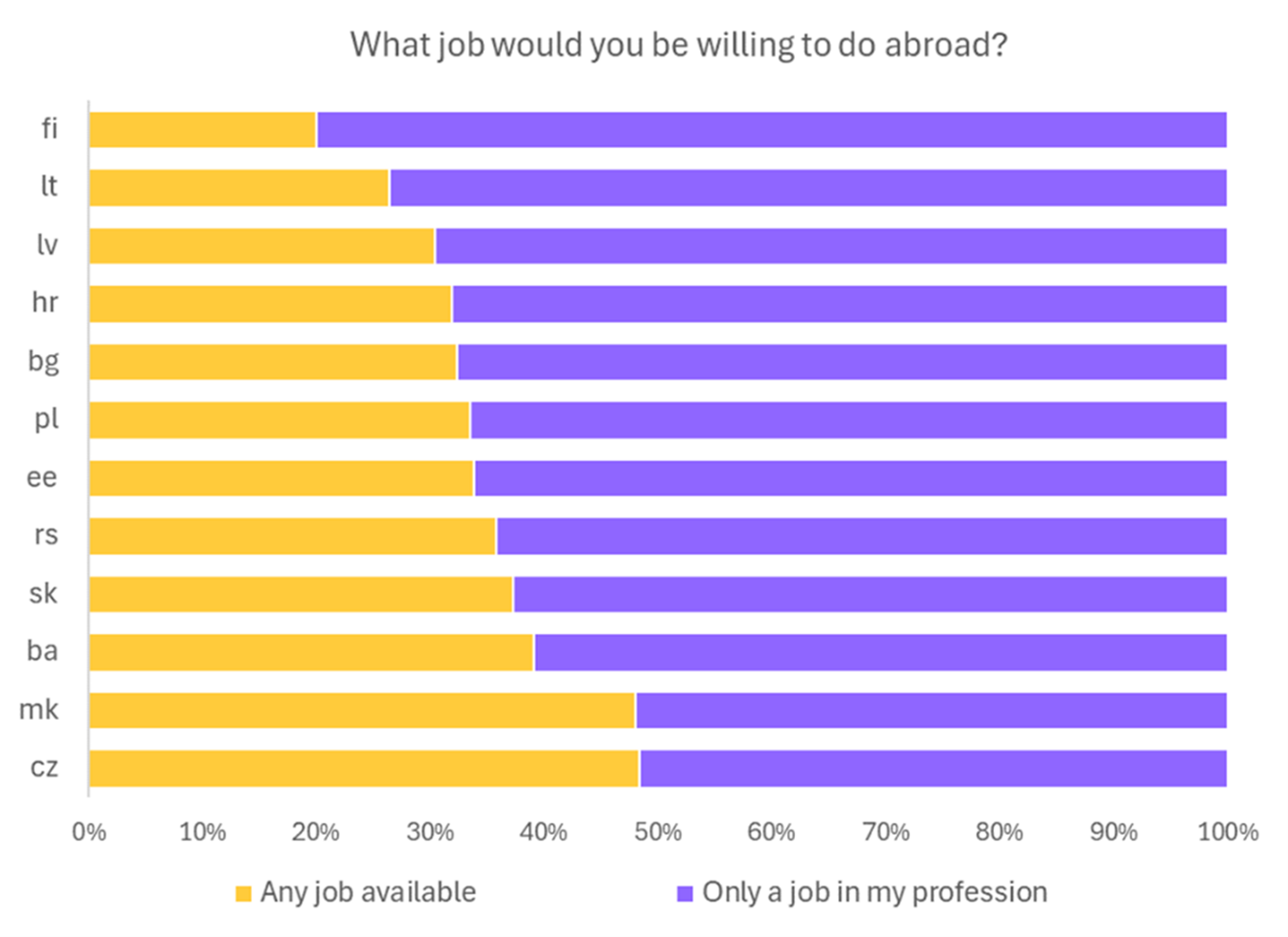
Serbia (RS) residents are the most likely to be willing to consider a lower employment position than their current one, with 59% of respondents saying "yes" when viewed from a perspective that is lower than the one that respondents hold in their home country. This implies that a sizable portion of Serbians are amenable to downward career mobility when required.
By contrast, only 17% of respondents in Estonia (EE) indicated that they would be amenable to such a shift. This suggests that Estonians would much rather keep or advance in their current employment status than accept a lesser one. The comparatively lower percentages in countries like Slovenia (SI) and Finland (FI), which are 33% and 40%, respectively, indicate a moderate degree of openness. Conversely, nations like Bulgaria (BG) and Croatia (HR) show a marginally greater willingness, at 44% and 46%, respectively.
The data, which shows Latvia (LV) at 51%, North Macedonia (MK) at 53%, Bosnia and Herzegovina (BA), and Slovakia (SK) at 55%, indicates a gradual increase in openness as we proceed from the Baltic republics towards the Balkans. Closely behind, Poland (PL) has 57% of respondents who said they would be open to considering a lower job.
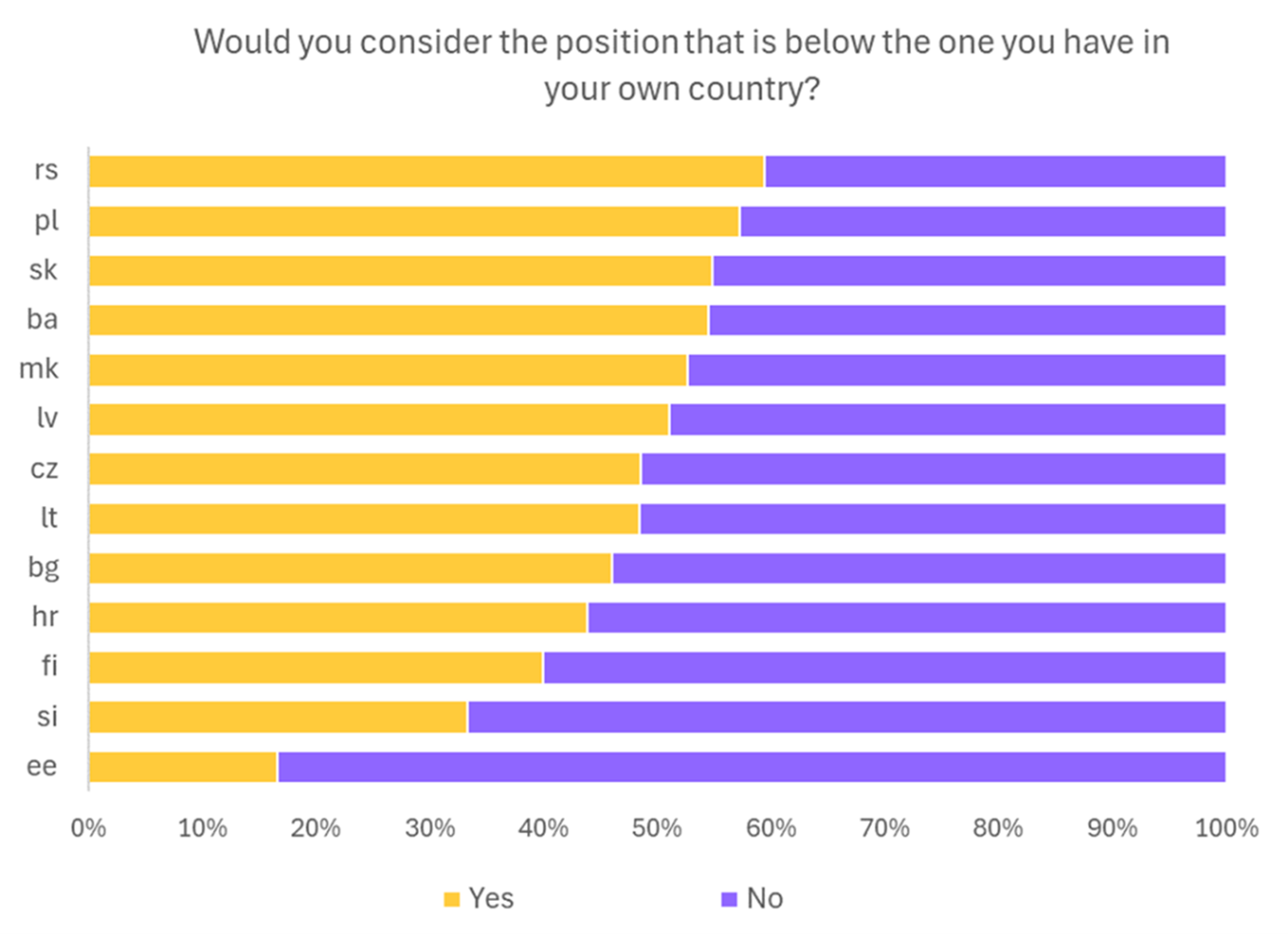
Willingness to relocate for a better job varies among countries
People in North Macedonia (28%), Estonia (27%), Bosnia and Herzegovina (26%) are more willing to relocate than people in Finland (20%), Slovenia (16%), and Poland (17%), and only very small amount of respondents in Lithuania (12 %) and Bulgaria (11%) are open to moving abroad in search of employment.
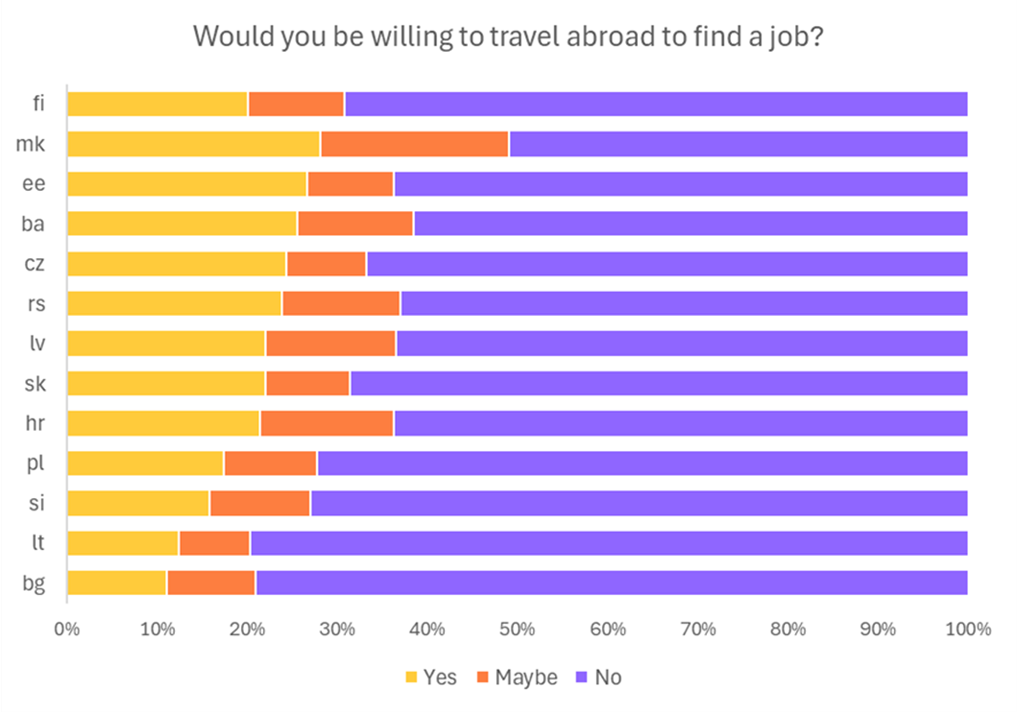
Conclusion
People in higher salary groups are becoming more likely to travel abroad in search of employment prospects. Across Central Europe, the Balkans, and the Baltic and Finland regions, the prospect of a better salary is the most compelling reason for considering employment abroad. However, the biggest obstacle to working abroad is the possibility of being separated from friends and family for an extended period of time. Main things that can prevent people from taking advantage of employment abroad are emotional connections and communication problems. In general, individuals are more willing to relocate in some countries than others (North Macedonia 28%, Estonia 27%, Bosnia and Herzegovina 26%), while people in Finland 20%, Slovenia 16%, and Poland 17% are less willing to travel.
About the survey. The survey was conducted in between 1 November 2023 and 31 January 2024 in 11 Alma Career countries: Bosnia and Herzegovina, Croatia, Czech Republic, Estonia, Finland, Latvia, Lithuania, North Macedonia, Poland, Slovakia and Slovenia. In addition, data were collected from Bulgaria and Serbia, where Alma Career works with partners.
ABOUT ALMA CAREER
Alma Career, the market leader in recruitment services across 11 countries in Europe, operates job board business with offering of over 1,5 million job opportunities, CV database of over 4,3 million, almost 2 million active job alerts, and over 5 million monthly visitors. Alma Career offers recruitment services based on data and technological innovation. The reach of Alma Career network is about 80 million people in Europe, revenue 110 million euros with nearly 800 recruitment business professionals in Eastern Central Europe (2023).
Alma Career is a global company with local heart; it has a deep knowledge, long expertise and cultural understanding of the local markets. Alma Career operates in Bosnia and Herzegovina, Croatia, Czech Republic, Estonia, Finland, Latvia, Lithuania, North Macedonia, Poland, Slovakia and Slovenia.
Alma Career is part of Alma Media Group, more information: Alma Media
Alma Career is part of the Alma Media Group: www.almamedia.fi
For further information, please contact:
Vesa-Pekka Kirsi, Business Director, Alma Career, tel. +358 10 665 2587

Why Training Alone Won’t Keep Employees from Leaving

Transparency, Data, and People: What We Learned at the HR Time Gathering in Zagreb

News for the User Experience Community: UX Research Academy for Everyone – Completely Free













